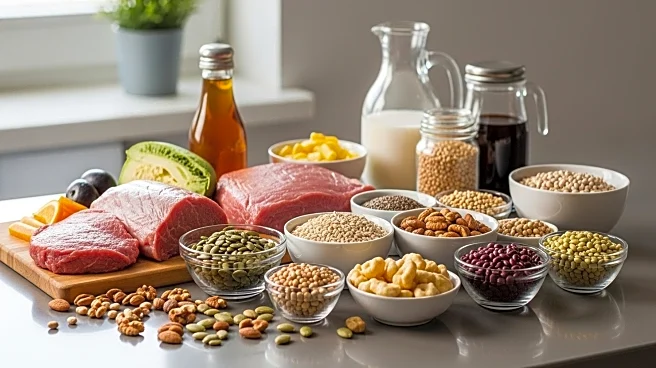What's Happening?
A recent article discusses the importance of protein intake for athletes aiming to build muscle and speed up recovery. According to David Goldman, a registered dietitian, active individuals should target 1.6 grams of protein per kilogram of body weight daily. The article lists ten high-protein foods recommended for athletes, including lean beef, chicken breast, turkey, fish, dairy, soybeans, hemp seeds, lentils, eggs, and almonds. Each food item is detailed with its nutritional benefits, such as creatine and omega-3 fatty acids, which aid in muscle recovery and growth. The article emphasizes the role of protein in maintaining muscle health and suggests incorporating these foods into post-workout meals for optimal results.
Why It's Important?
Protein is crucial for athletes as it supports muscle repair and growth, which are essential for performance and recovery. The recommended foods not only provide protein but also contain other nutrients like omega-3 fatty acids and antioxidants that help reduce inflammation and muscle soreness. This information is vital for athletes and fitness enthusiasts who need to optimize their diet to enhance their training outcomes. By understanding the nutritional benefits of these foods, athletes can make informed dietary choices that support their physical goals and overall health.
What's Next?
Athletes and fitness enthusiasts may consider adjusting their diets to include these high-protein foods, particularly after workouts, to maximize muscle recovery and growth. Nutritionists and dietitians might further explore the benefits of these foods and develop tailored meal plans for clients. Additionally, ongoing research into the effects of protein and other nutrients on athletic performance could lead to new dietary recommendations and strategies for optimizing muscle health.
Beyond the Headlines
The focus on high-protein foods highlights the broader trend of personalized nutrition in sports and fitness. As athletes seek to enhance performance through diet, there is an increasing interest in understanding how specific nutrients affect muscle health and recovery. This trend may lead to more specialized dietary guidelines and products designed to meet the unique needs of athletes. Furthermore, the emphasis on plant-based proteins like soybeans and lentils reflects a growing awareness of sustainable and ethical food choices in the sports nutrition industry.











